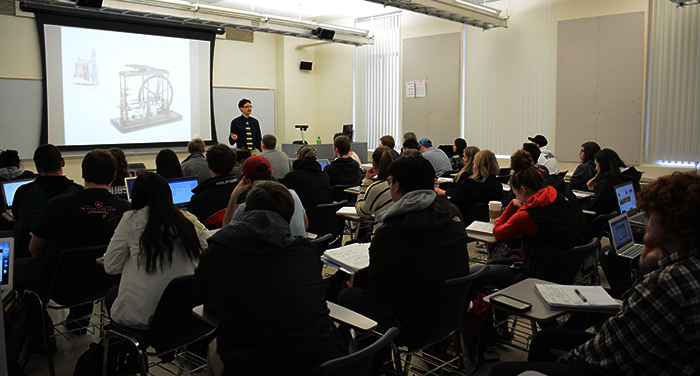UCORE classes should prepare students for life
HARRINA HWANG | The Daily Evergreen
Phillip Guingona, a History 105 professor, lectures his students on Tuesday in Carpenter Hall. History 105 is required for most students.
January 25, 2017
You’re a nursing major, sitting in the back of your History 105 class, wondering what the concepts of Roots of Contemporary Issues have to do with your chosen field.
Or perhaps you are a business major, wondering why your hard-earned tuition money is going toward a geology class for the UCORE science requirement. In fact, you might have chosen business as your major specifically because you barely passed any of your science classes in high school and decided the science field was definitely not for you.
UCORE classes are required to graduate. They are designed according to the Seven Learning Goals and Outcomes that WSU has set forth for all students to develop before graduation. The seven learning goals and outcomes are meant to enhance any student’s skill set and expand them to include things like quantitative reasoning, creative writing, diversity and so on.
To be clear, having a set of general education classes is not inherently a bad idea. It gives undecided students a chance to test the waters and see what fields they may be interested in pursuing. The diversity requirement is somewhat beneficial in helping students become more culturally competent. However, cultural competency training could be included in the required workshops that freshmen take along with “Green Dot” and “Booze, Sex and Reality Checks.”
Another argument might be that it shapes students into “well-rounded” individuals. Sort of like the individuals they were trying to make us when we were forced to take general education classes from kindergarten through high school, I suppose.
The skills that UCORE attempts to implement in students are fantastic, but present prior to post-secondary education.
I believe that WSU college graduates would be just as successful in the real world without them.
“All our classes should correlate more with students’ specific majors,” WSU senior criminal justice major Luz E. Olivera said. “This would strengthen their knowledge in their fields and make them better candidates for employment after graduation.”
Perhaps they would be even more successful with core classes that prepared them for life as a real adult. For example, students who don’t come from privileged socioeconomic backgrounds, with substantial cultural capital, may have trouble understanding how taxes work and how to go about filing them.
Or perhaps a class on professionalism, including how to write a resume and cover letter, or job interview prep classes that would help students transition into the professional world. Even a class on United States law would be beneficial to preparing students for life as an adult, after university.
While this information is available online, so are the details of the same Cold War that I studied in my History 105 class as a freshman.
UCORE classes and general education core classes at four-year institutions should teach skills that students are going to utilize for the rest of their lives.
However, in a country where students are paying on average $9,000 for tuition and fees, students should specialize their education as soon as they feel comfortable to do so.
If our K-12 school system was doing its job, its graduates would already be “well-rounded” people before they enter post-secondary education. That way they wouldn’t have to spend time and money on more general education classes.
Basheera Agyeman is a junior comparative ethnic studies major from Accra, Ghana. She can be contacted at 335-2290 or by [email protected]. The opinions expressed in this column are not necessarily those of the staff of The Daily Evergreen or those of The Office of Student Media.

















